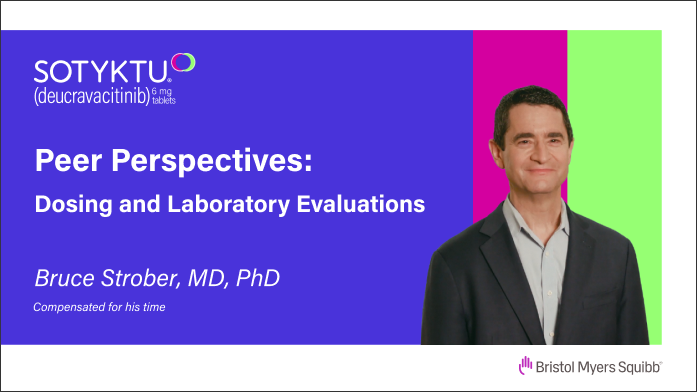
DOSING
Simple once-daily dosing from the start1

Patients may take SOTYKTU anywhere, at any time that fits into their daily schedule
SOTYKTU is the first and only once-daily oral TYK2 inhibitor with1:

| NO DOSE TITRATION OR DOSE ADJUSTMENT |
| NO KNOWN DRUG-TO-DRUG INTERACTIONS Avoid use of live vaccines |
| CAN BE TAKEN WITH OR WITHOUT FOOD |
| ONLY TB EVALUATION Is required for treatment initiation (unless patients have known or suspected liver disease*) |
| * | In patients with known or suspected liver disease, evaluate liver enzymes at baseline and thereafter according to routine patient management. Not recommended for use in patients with severe hepatic impairment. |
- Update immunizations according to current immunization guidelines. Periodically evaluate triglycerides according to clinical guidelines.
SOTYKTU tablet is not shown at actual size. For illustrative purposes only.
NDC: 0003-0895-11
TB=tuberculosis; TYK2=tyrosine kinase 2.
Simply Start SOTYKTU
| EVALUATE for TB1†‡ |
| INITIATE therapy |

| † | Prior to initiating treatment: evaluate patients for active and latent TB infection and update immunizations according to current immunization guidelines.1 |
| ‡ | In patients with known or suspected liver disease: evaluate liver enzymes at baseline and thereafter according to routine patient management. SOTYKTU is not recommended for patients with severe hepatic impairment.1 |
| Periodically evaluate serum triglycerides according to clinical guidelines during treatment.1 |
Bruce Strober, MD, PhD, discusses once-daily dosing and laboratory evaluations for SOTYKTU
ARE YOU READY TO EXPLORE MORE? SELECT A TOPIC BELOW.
Reference:
- SOTYKTU [package insert]. Princeton, NJ: Bristol-Myers Squibb Company; 2022.
